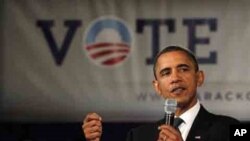U.S. President Barack Obama has held several big rallies on college campuses to try to rekindle the enthusiasm he generated among young people during his bid for the White House two years ago.
Voters under the age of 30 went to the polls in record numbers in 2008, with about two-thirds of them voting for then-Democratic candidate Barack Obama.
Zach Howell is President of the College Republican National Committee. He remembers rough times for Republicans looking for votes on college campuses two years ago. "It was not a good thing to be a Republican on campus in those days. It was about the most uncool, taboo thing you could be on campus," Howell says, "So you know, a lot of young conservatives kind of went into hiding, so to speak, for a little while there in 2008. This year, it is completely different. They are out there working hard. They are proudly identifying as conservatives, as Republicans."
With public opinion polls showing Democrats likely to lose seats in the House of Representatives and perhaps the Senate, President Obama is reaching out to young people, asking them to vote for Democratic candidates in congressional and gubernatiorial races across the country on November 2.
Speaking recently to some 35,000 people at Ohio State University, Mr. Obama acknowledged that running for the White House was more glamorous than governing.
"And now we are not just advocating change. We're not just calling for change. We're doing the hard work of change - we're grinding it out. Sometimes it's frustrating," Mr. Obama said. "We're delivering change inch by inch, day by day. It's not easy. Believe me, I know it's not easy."
The president called on young people to recapture the enthusiasm they had for the electoral process in 2008, and to keep working for change.
Heather Smith is Executive Director of Rock the Vote, a non-partisan organization that promotes youth voter registration and political participation. She says many young people are skeptical of the president's attention ahead of next month's midterm elections. "The initial reaction was a little bit of, you know, 'Where have you been? We thought we were in this together. We came out; we worked hard; we went to the polls like you told us to, we are waiting for this leadership," Smith said. "Where have you been?'"
Smith says that despite such skepticism, young people want leadership. She says that explains the turnout of tens of thousands of young people at recent rallies by the president on college campuses.
But a recent public opinion survey by the Pew Research Center shows that 27 percent of young Democrats say they are giving much thought to the elections. The number for young Republicans focused on the vote is 39 percent.
A recent Associated Press-mtvU poll shows that 44 percent of college students approve of the job Mr. Obama is doing as president. That is a 16 percentage point decline from May of last year.
Republican student leader Zach Howell says unemployment is the top issue for young voters.
"It is all about the economy. That is everything to them. I mean, 20 percent of college graduates are unable to find work right now," Howell says, "So young people are concerned about their futures; they are not as confident as most generations in the past have been able to be. And they want to see policies put in place that enable them to live out their dreams and they are not seeing that out of this president and this Congress."
Smith agrees that young people care about jobs and their futures. She adds that there are specific reasons why young people tend to vote less frequently than other Americans.
"They are new to the process and that means that for the majority of them, they need to register to vote for the first time," Smith says, "There are nine million people who have turned 18 since the 2008 election. They all need to be registered to vote. And yet, we don't have an infrastructure in place to make that easy and accessible to young people."
Smith is calling for more civics education in schools and new procedures to make it easier to register to vote. She says the number of people under the age of 30 in the United States is so large that only a two percent increase in voter turnout could determine which major political party - the Democrats or the Republicans - will control one or both houses of Congress.
Howell says there is a widespread misconception that most young people tend to vote for Democratic Party candidates.
"From a historical perspective it is not true. [Ronald] Reagan won the youth vote; George H. W. Bush won the youth vote; Bill Clinton carried it pretty heavily, but then it went back to George W. Bush in 2000. So it is split between both parties over the last couple of decades. And obviously, Obama won it by a heavy margin. But like I say, we are seeing a very healthy swing back toward the Republican Party," Howell explains.
As November 2 approaches, both parties are hoping to inspire young voters to turn out in force for their candidates.




